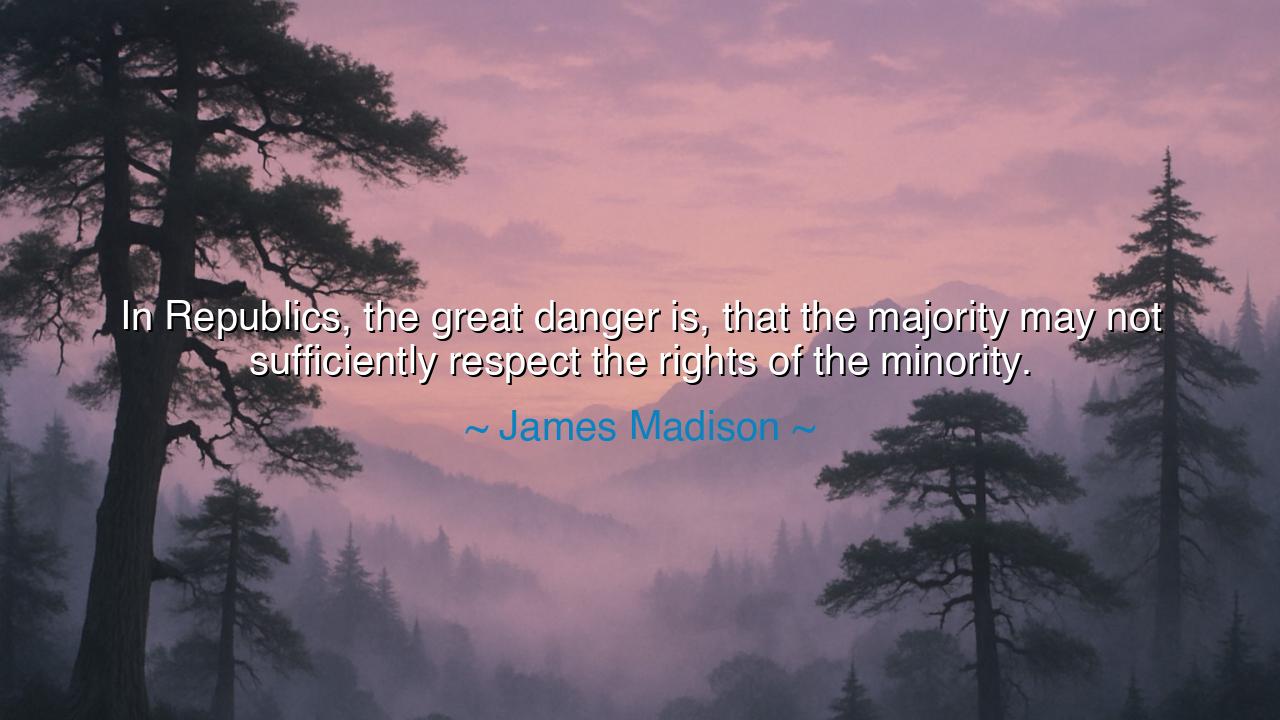
In Republics, the great danger is, that the majority may not
In Republics, the great danger is, that the majority may not sufficiently respect the rights of the minority.






Hearken, O children of law and conscience, and attend to the words of James Madison: “In Republics, the great danger is, that the majority may not sufficiently respect the rights of the minority.” In these words lies a meditation upon justice, governance, and the eternal tension between power and principle. From the dawn of human civilization, societies have grappled with the rule of the many over the few, and the challenge of ensuring that the strong do not oppress the weak. Madison, a founder and guardian of republics, warns that freedom is fragile, for it is not merely the consent of the majority that defines justice, but the protection of every soul within the polity.
Consider the nature of majority rule. In a republic, the collective voice of the people guides law and custom. Yet unchecked, this voice may trample the rights of those who differ in opinion, belief, or circumstance. The majority, in its strength, may forget mercy, fairness, and the sanctity of individual liberty. Madison’s insight is timeless: the measure of a society’s virtue is not only in its ability to represent the majority, but in its devotion to uphold the dignity and rights of the minority.
History provides haunting examples of this peril. The early Roman Republic, though guided by assemblies and consuls, witnessed the oppression of the plebeians by patricians, whose decisions often disregarded the welfare of the lower orders. Only through struggle, codification, and negotiation—the Twelve Tables, tribunes, and reforms—did the Republic begin to recognize the need to safeguard minority rights. Madison’s warning echoes across time: without mechanisms of protection, the majority’s power may erode justice and imperil freedom.
Even in more recent history, the United States itself has faced the challenge Madison described. The struggles of African Americans, women, and other marginalized groups illustrate the consequences when the majority’s will overrides the rights of minorities. The Civil Rights Movement of the twentieth century serves as testament to both the danger and the remedy: when injustice prevails, the oppressed must be defended by law, conscience, and civic courage, ensuring that the republic remains true to its founding principles.
Madison’s reflection also illuminates the necessity of checks and balances. Constitutions, courts, and civil protections exist to prevent the tyranny of the majority. Without these safeguards, freedom is illusion, for those without power or influence may be silenced, oppressed, or excluded. The wisdom of a republic is measured by the mechanisms it erects to protect the vulnerable, and by the moral conscience of its citizens who respect the rights of all, not merely the preferences of the many.
From this teaching flows practical wisdom. Uphold justice not only for yourself but for all, especially for those whose voices are weaker or unheard. Engage in civic life with awareness of minority rights. Challenge injustice when the majority errs, and advocate for structures, laws, and practices that ensure equity, fairness, and protection. Liberty without protection is hollow; democracy without justice is fragile.
Let the generations remember this eternal truth: the health of a republic depends on the protection of the minority as much as the voice of the majority. Madison’s words remind us that power, left unchecked, can corrupt, but wisdom, law, and virtue sustain society. To honor a republic is to ensure that every individual, regardless of status or number, is shielded by the principles of equity and conscience.
Therefore, O seeker of justice, act with vigilance and courage. Respect the rights of those around you, particularly the marginalized and unheard. Build institutions, habits, and laws that protect the weak and guide the strong. In doing so, you uphold the enduring promise of a republic: that freedom is not merely the privilege of the many, but the sacred inheritance of all.






AAdministratorAdministrator
Welcome, honored guests. Please leave a comment, we will respond soon